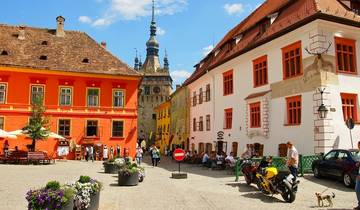
Having traveled to Hungary thrice across three distinct decades, I’ve acquired a thorough insight into travel expenses in Budapest. My initial trip occurred in the 2000s, the subsequent one in the 2010s, and the latest during October 2024, during which I spent 17 days delving into the city and its vicinity. This prolonged visit enabled me to collect precise and up-to-date cost data for tourists.
Although Hungary has faced inflation like numerous other nations, its currency, the forint, has depreciated against the U.S. dollar. This currency adjustment is advantageous for travelers utilizing dollars or euros, as Hungary is still part of the EU and Schengen Zone without having adopted the euro. In 2012, the exchange rate was 230 forints to the dollar; currently, it hovers around 400 to the dollar.
On my most recent trip, I observed that while certain prices have stayed constant, others, especially in eateries and hostels, have surged considerably. Groceries, on the other hand, still provide excellent value, and Hungary ranks among the least expensive wine countries worldwide, along with reasonable beer choices.
Public transportation stands out as another significant bargain in Budapest, particularly local trains and trams. A monthly pass delivers fantastic value, even for shorter visits. For connectivity, our T-Mobile service functioned fairly well, though an eSim for Europe might offer enhanced speeds. The Google Translate app is also crucial since Hungarian poses a considerable challenge for learners.
Travel Expenses in Budapest: Transportation
A single metro ticket ranges from $1.15 to $1.80, but acquiring a monthly pass for $23 proves to be a smarter choice for extended stays. A 72-hour pass costs less than $14, and the Budapest Card includes public transportation options. The Budapest metro is efficient and features modern lines alongside a historic original line that’s a must-ride for its nostalgic allure.
We also enjoyed side excursions via Hungarian trains, with round trips to Szentendre costing about $2 and to Eger $7. The journey from Prague to Budapest aboard a Regiojet train was comfortable, with reasonably priced food and beverage options.
Taxi fares from the airport to the city center can reach $35, but the reverse journey is less expensive. Alternatively, a special metro train from the airport provides a better deal. Within the city, taxi rides range from $4 to $10, with a base fare of 1,100 forint and 440 per kilometer. Uber resumed operations in Budapest in 2024, ensuring predictable pricing.
Numerous locals prefer biking, with designated bike lanes on major roads. Public city bike systems are available, although I faced challenges with app activation.
Hostel and Hotel Rates in Budapest
Accommodation rates have risen, making it beneficial to secure lodging through platforms like HomeExchange.com. Budapest’s rising popularity has pushed hotel prices higher, particularly during peak periods. Apartment rentals on Airbnb and Booking.com present alternatives, with nightly rates between $60 and $80.
Mid-range hotel costs have escalated, with options ranging from $80 to $160 in busy months. High-end hotels such as the Ritz-Carlton and W Budapest still maintain relatively good offers below €350 per night. Yet, hostel rates have increased, with dormitory beds costing $22 to $50 in the off-season and up to $80 in summertime.
Food and Beverage Prices in Budapest
Grocery shopping remains cost-effective, with a $55 total covering a range of essential items. Produce from fruit and vegetable stalls offers even more competitive prices. Central Market Hall provides local offerings at half the cost found in the USA or Canada, with sausages and cheeses priced between $10 and $20 per kilo.
Street cuisine like langos and bakery items are hearty and reasonably priced. That said, dining out has grown pricier, with restaurant meals ranging from $30 to $50. Beverages remain affordable, with beer and wine often costing less than soda. Hungarian wine presents excellent value, with bottles priced from $2 to $10.
Museums and Attractions in Budapest
Admission fees for museums and attractions differ, with the Budapest Card providing discounts and free entries. Many museums charge $10 to $20, while baths can cost up to $50. We chose the more budget-friendly Palatinus Baths on Margarita Island, costing less than $10.
Overall, Budapest presents a combination of stable and escalating prices, with transportation and groceries yielding the best value. With thoughtful planning, travelers can relish this lively city without straining their finances. For additional budget tips, visit Budapest on